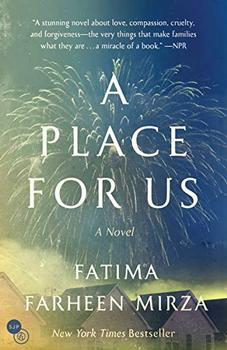Summary | Excerpt | Reading Guide | Reviews | Beyond the Book | Readalikes | Genres & Themes | Author Bio

The wedding was coming together wonderfully. People were arriving on time. There was a table for mango juice and pineapple juice and another for appetizers, replenished as soon as the items were lifted from the platter. White orchids spilled from tall glass vases on every table. Little golden pouches of gifts waited on each seat for guests to claim. Huda had helped Layla make them and they had stayed awake late in the night, singing a little as they filled each one with almonds and various chocolates, tugging the golden string to seal them. The hall was grand—she had chosen it with Hadia months ago—and as she walked beneath its arches into the main hall she was pleased with her decision. It had been dimmer when they first saw it, but now it looked like the set of a movie, high ceilings and every chandelier twinkling so bright they seemed to compete with one another to illuminate the room. Men looked sharp in their dark suits and sherwanis, women dressed so that every shade of color was represented, light reflecting off of their beadwork and threadwork. Layla wished her parents had been alive to see it. How proud they would be, how happy to attend the wedding of their first grandchild. But tonight even their absence could not dull all she had to be grateful for, and beneath her breath she continued to repeat, God is Great. God is Great, and all thanks are to Him.
Just an hour earlier she had helped Hadia into the heavy kharra dupatta, whispered prayers as she clasped safety pins in place. Hadia had not spoken as Layla moved about her, only thanked her once, quietly. She was nervous, as any bride would be, as Layla herself had been years ago. Layla adjusted the outfit's pleats, hooked a teekah into Hadia's hair, and stepped back to take in the sight of her daughter. All her intricate henna. Her jewelry catching light. The swoop of dark hair that peeked beneath her dupatta, that particular and deep red.
Now she searched the crowd for her son. It felt unfathomable that just days ago she still had trouble sleeping when the darkness called forth her unsettling fears. In the daylight she could reassure herself that it was enough to see her son's face in the photographs she saved, hear his voice in the family videos she watched—Amar on a field trip she had chaperoned, his excitement when the zookeeper lifted up a yellow python, how his hand was the first to shoot into the air, asking to touch it. It was enough so long as she knew he was still out there, heart beating, mind moving in the way she never understood.
This morning she had woken to a home complete. Before her children could rise she took out sadqa money for them, extra because it was a momentous day, then more, to protect from any comment about her son's return in a tone that could threaten its undoing. She drove to a grocery store and stocked the fridge with food Amar enjoyed: green apples and cherries, pistachio ice cream with almonds, cookies with the white cream center. All the snacks she once scolded him for. Was she cruel to feel more happiness, greater relief, at his return, than for her daughter on the day he had come back for? Before Rafiq left to oversee arrangements in the hall—the tables brought in, golden bows tied to the chairs, the setting of the stage where Hadia and Tariq would sit—Layla climbed the stairs to their bedroom, where he was getting ready.
"Suno," she said, "will you listen? Can you not say anything that will anger or upset him?
She always found ways to speak around her husband's name. First it was out of shyness and then it was out of custom and a deep respect for him, and now it would be unnatural; she felt obliged to avoid his name out of habit. He paused buttoning his shirt and looked at her. It was her right. She had not interfered with his decisions for so long. She pressed on, "Please, for me, can you stay away from him tonight? We can speak tomorrow, but let us have this day."
Excerpted from A Place for Us by Fatima Farheen Mirza. Copyright © 2018 by Fatima Farheen Mirza. All rights reserved. No part of this excerpt may be reproduced or reprinted without permission in writing from the publisher.
Your guide toexceptional books
BookBrowse seeks out and recommends the best in contemporary fiction and nonfiction—books that not only engage and entertain but also deepen our understanding of ourselves and the world around us.